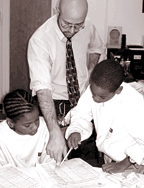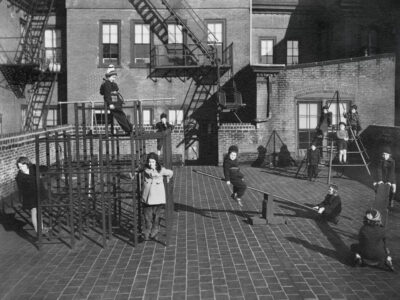
Middle-school principal Jason Botel C’97 G’97 has every reason to gloat. On the standardized Maryland School Assessment (MSA) test last year, his fifth-graders at KIPP Ujima Village Academy in Baltimore scored the fourth-highest in math out of 117 public schools in the city. In reading, they scored 36th-highest, exceeding the city average and state standards. Furthermore, the school’s attendance rate was a whopping 98.9 percent.
But Botel’s not gloating—he’s already focused on getting those reading scores up.
“Overall, we’re pretty happy with the results,” he says. “But we’re definitely not sitting back.” To say that Botel is dedicated to his job is an understatement. The 28-year-old was the driving force behind the public charter school he launched in August 2002 with funding from the Baltimore City Public School System and nonprofit foundations. He and four teachers recruited the first class of 73 fifth-graders themselves, going door-to-door in Baltimore’s rough Lower Park Heights neighborhood. Enrollment doubled for the 2003-04 school year, ushering in a new class of 80 fifth-graders. (Total enrollment is currently 150 for the two grades.) “We ultimately want to get 80-85 students per grade level for grades 5 through 8—that’s the typical KIPP model,” says Botel.
KIPP Ujima Village Academy is one of 32 KIPP schools in the country. KIPP—which stands for the “Knowledge is Power Program”—was the brainchild of two Teach for America alumni in Houston, Michael Feinberg C’91 [“Hello, Mr. KIPP,” December 1996; “Profiles,” November/December 2000] and David Levin. The fifth-grade teachers started KIPP in 1994 with 50 students and a single classroom. Rather than send their students to low-performing middle schools, they proposed keeping them through the eighth grade to prepare them for college-preparatory high schools. In 2000, Donald and Doris Fisher, founders of Gap, Inc., partnered with Feinberg and Levin and created the KIPP Foundation to recruit and train educators to open their own academically rigorous, public charter schools in educationally under-served areas throughout the country.
Botel heard about KIPP in 2000 from a friend while he was traveling in Israel following a three-year stint with Teach for America in Baltimore. In Israel, Botel lived on a kibbutz and visited “youth villages,” public boarding schools for underprivileged children. “I had heard that these schools are very successful,” he says. “I started thinking about what was it about them that was missing from American public schools.”
Botel zeroed in on two factors. One was that students spent more time in a positive learning environment at the boarding schools. They also shared a set of values and rituals that contributed to a strong sense of community. KIPP’s philosophy seemed to mesh with his own, so Botel sent for an application to their school leader-training program.
“I had already planned to go into school leadership,” says Botel, who graduated from Penn in 1997 with both a bachelor’s and master’s degree in English. “In fact, I was finishing up my application to the Harvard Graduate School of Education for their school principal certification program.”
Botel’s experience at Penn hinted at his future as an educator. In addition to working and volunteering as a tutor, he took a course called “Teaching American Studies” from Dr. Peter Conn, the Andrea Mitchell Professor of English who now serves as deputy provost. “It partnered each student with a teacher at University City High School,” says Botel. “I went three days a week and helped the teacher plan lessons, and taught some myself. It was a great gateway between being an undergrad and getting involved in teaching. I was introduced to the many challenges facing public education in inner-city Philadelphia—some of the same challenges we face here in Baltimore.”
All KIPP schools are built on “five pillars”: high expectations for academic achievement and conduct; choice and commitment to the school and to each other; more time in school; principals with control over budget and hiring; and an unrelenting focus on academic performance. “The only missing piece of the puzzle was the shared set of values,” says Botel.
After reflecting on his own education in Jewish identity and cultural history—he grew up in Cherry Hill, New Jersey, attending Hebrew school weekly—and his school’s largely African-American population, Botel eventually hit upon the idea of structuring his school on the principles of Kwanzaa, an African-American cultural holiday focused on seven principles. The school’s name comes from the third principle, ujima, meaning “collective work and responsibility.”
“As long as you uphold KIPP’s five pillars, you’re welcomed and encouraged to structure your school as you think will best meet the needs of your students,” Botel explains.
KIPP’s rigorous curriculum includes classes from 7:30 a.m. to 5:00 p.m. Monday through Friday, as well as half-days on Saturday and a mandatory three-week summer session. Students earn “paychecks” each week for attending school and completing their homework; they are paid in “KIPP dollars,” which they may spend on school supplies and field trips.
Last April, Botel took a group of students to visit Penn. “Professor [Tukufu] Zuberi [director of the Center for Africana Studies] and some other professors talked to our kids about climbing the mountain to college and having the freedom to choose what they want to do in life,” he says.
Though the school’s standardized test results are impressive, not all positive results can be measured in numbers. Parents regularly tell Botel that the school is the best thing to happen to their kids.
But while he’s pleased with the response, Botel has bigger goals. “As a national movement, we’re not just looking to give a finite set of kids a better education,” he says of KIPP. “We’re hoping to have some kind of ripple effect—that the commitment of our teachers and the level of performance will inspire other schools to reach the same level of commitment and performance.”
—Abigail Green




